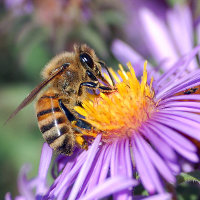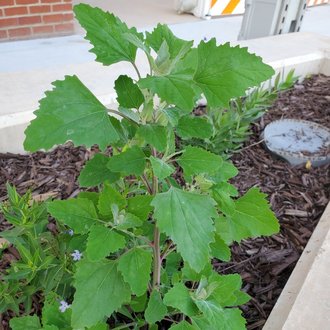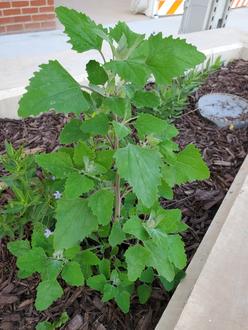Lambsquarters (Chenopodium album L.)
Also known as Lamb's Quarters.
↑Summary
A common, edible annual weed of disturbed areas; both native and introduced varieties are found in North America.
↑Range
This species is native both to Europe and North America; the introduced European variety is much more widespread than the native variety, which is mostly limited to the eastern or eastern-to-central US; different sources recognize different varieties and report different ranges for these varieties which complicates building this species' map.↑Uses
The leaves and tender young shoots are edible cooked; the raw leaves have an undesirable velvety texture. The seeds are also edible and can be cooked as a grain like the seeds of quinoa, a close relative, although they are smaller and higher in saponins than cultivated grain.
Native Americans traditionally made a flour from the seeds.
↑Related Plants
Numerous other Chenopodium species, both native and introduced, are found across North America. The best-known of these is quinoa, Chenopodiu quinoa, but this is only established at one site in New Mexico. Many of the other species are common, but are mostly inconspicuous weedy plants.
↑Links & External Resources
• Chenopodium album (Lamb's Quarters) | Illinois Wildflowers (About This Site)
• Chenopodium album (Lambsquarters) | USDA PLANTS Database (About This Site)
• Chenopodium album | Go Botany (About This Site)
• Chenopodium album | Biota of North America Project (BONAP) (About This Site)
• Chenopodium album | NatureServe Explorer (About This Site)
• Chenopodium album | Flora of North America (About This Site)
• Chenopodium album | Missouri Plants (About This Site)
• Missouri Lambsquarters | Maryland Biodiversity Project (About This Site)
• Chenopodium album (Lamb's-quarters) | Minnesota Wildflowers (About This Site)
• Chenopodium album L. (Lamb's-quarters, Pigweed) | Digital Atlas of the Virginia Flora (About This Site)




